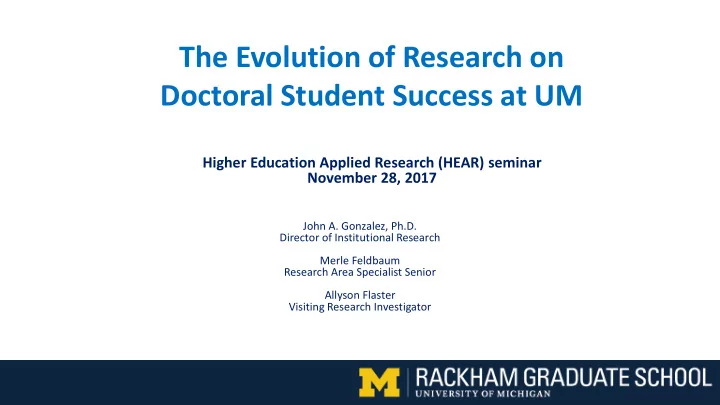

The Evolution of Research on Doctoral Student Success at UM Higher Education Applied Research (HEAR) seminar November 28, 2017 John A. Gonzalez, Ph.D. Director of Institutional Research Merle Feldbaum Research Area Specialist Senior Allyson Flaster Visiting Research Investigator
The Golden Triangle of Institutional Research Volkwein, J. F. (2008), The foundations and evolution of institutional research. New Directions for Higher Education, 2008: 5–20. doi:10.1002/he.289
Perspective Matters
Case Study 1: Descriptive Metrics • More than 5300 PhD students (and over 8500 total graduate students) are enrolled in Rackham across 18 schools and colleges • Rackham spends more than $60 million annually supporting graduate students and programs • Completion rates continue to improve (~75% of PhD students graduate) but disparities remain • Questions remain unanswered about many aspects of the graduate experience and Rackham’s impact in that experience
Case Study 1: Descriptive Metrics • Descriptive metrics derived from institutional data; often broken down by standard demographics • Part of standard reporting but often lacking context • Uncontrolled for unobserved/exogenous factors
Case Study 2: Post Hoc Analysis • We combine institutional data with data collected from surveys • Post-hoc, we examine relationship between particular outcomes and certain hypothesized indicators
Case Study 2: Post Hoc Analysis Ph.D. Experience Study (2009-2012) Goals of the Study • To monitor the impact of the change in registration policy implemented in Fall, 2010 • Provide detailed information about the experiences of doctoral students. • Topics include: satisfaction with graduate experience; funding; relationship with primary advisor, relationship to other faculty members and peers; professional preparation activities; time use; work-life balance; suspension of work on doctoral program; individual life situations • Samples of Rackham doctoral students who were beyond their first year of doctoral study
Case Study 2: Post Hoc Analysis Exploratory Analysis of Discontinuation Using survey data from 2009, a logistic regression was run to see what factors predict whether a student later discontinued from their doctoral program. There were three variables, in addition to candidacy status, that significantly affected the likelihood of discontinuing. Adjusted Predictions with 95% CIs Adjusted Predictions with 95% Confidence Interval Candidacy # Stop Out Factors that reduced the likelihood of 1 discontinuing .8 • Having a more constructive and supportive .6 relationship with their primary advisor Pr(Dc) • .4 Receiving constructive feedback from other faculty .2 Factors that increased the likelihood of 0 discontinuing 1 2 3 4 5 Relationship with Primary Advisor • Students who have suspended work Pre-Candidate, No Stop Out Pre-Candidate, Stop Out Candidate, No Stop Out Candidate, Stop Out on their doctoral program previously
Case Study 2: Post Hoc Analysis Limitations • Post-hoc analyses are narrowly-targeted given the design of the available data • Existing data are inadequate for holistically understanding the doctoral student experience – Operationalization of success is binary – Data is mostly cross-sectional – Analytic window is too narrow
Case Study 3: Rackham Research Agenda Research Agenda Qualities • Broad , so it is informative about many aspects of the doctoral experience • Longitudinal , so we can study the process of doctoral education • Theory-driven, which allows us to understand the mechanisms behind student success
Case Study 3: Rackham Research Agenda Michigan Doctoral Experience Study [MDES] • Five year longitudinal survey of 5 doctoral cohorts at UM • Wave 1 fielded in September 2017 • Response rate: 77% (n=792) • Measures: – Pre-socialization experiences and expectations – Identification with social groups and roles – Baseline disciplinary identity and motivation
Case Study 3: Rackham Research Agenda
Please indicate whether you had the following experiences prior to the start of the Fall 2017 term
Which of the following best describes your family's financial situation most of the time when you were growing up?
Golden Ratio of Institutional Research Student Experience Predictive Assessment & Analytics Accreditation Data Climate & Integrity & Equity Management Budget and Planning Reporting & Compliance Evaluation
Recommend
More recommend